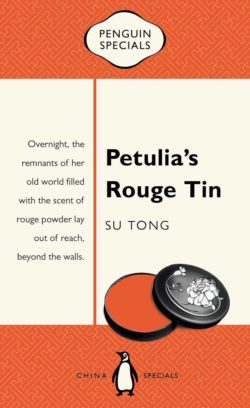Petulia's Rouge Tin by Su Tong
Translated by Jane Weizhen Pan and Martin Merz
2018, Penguin Specials
Publisher's blurb
Who would have anticipated that Petulia, stripped of her silk gowns, would be forced to denounce the Red Delight Pavilion?
Or believed that Autumn Grace would cry in desperation as nuns shave off her locks? After years working side-by-side, their sudden goodbye was the first sign of a changing society. Still, the scent of rouge filling their memories keeps them close, despite the twists and turns that life throws at them. Until one day, the promise of love and stability becomes a temptation neither can deny . . .
Reading Chinese Network Reviews
Reviewed by Simona Siegel, 4/7/19
 This is the first book from the Penguin Specials series that I have read. Exactly as it says on the very first page - the story is short enough to be read in a single sitting. I took it with me to read it on my way to work and almost forgot to get off on my station that's how interesting it was. It was truly fascinating how such a powerful story could be told in less than 100 pages, without judging the situation and yet provoking further thinking about this topic.
This is the first book from the Penguin Specials series that I have read. Exactly as it says on the very first page - the story is short enough to be read in a single sitting. I took it with me to read it on my way to work and almost forgot to get off on my station that's how interesting it was. It was truly fascinating how such a powerful story could be told in less than 100 pages, without judging the situation and yet provoking further thinking about this topic.
I must point out the great job the translator did when translating into English. The translator decided to use the Wade-Giles system instead of Pinyin to keep the nostalgia of the period, and the names of two main characters - Petulia and Autumn Grace were translated into English in order to convey the author's intended meaning of names. I find this a perfect way how to better understand the story and get closer to Chinese culture and the message, which are in every part of the story.
The short story begins in 1950's in China, when the government decided to clean the society of bad influences. One such group of troublemakers were prostitutes, already living on the edge of the society. It was usually a young unfortunate girl who became a prostitute, it was not a voluntary decision and there was nothing noble about it. Girls belonged to a house where they lived and were on the bottom of the social hierarchy, not as “noble” and “part of the culture” as e.g. geishas. There were no high hopes for them, nor a chance to find a husband and start a proper family, as the stigma would be just forwarded to the rest of the family. So when this re-education of prostitutes began, nobody really knew what the outcome would be. The government created re-education camps, in this story a factory, where all of them were kept in inhumane conditions and taught “new manners”.
“ 'How can this damn place be fit for human habitation!' Lucky Phoenix grumbled. 'No one wants to treat you like a human, anyway. You're lucky you haven't been shot dead!' someone else snapped in the darkness.
Despite the name of the book - Petulia's Rouge Tin - there are two female main characters and one male, though Petulia is the one moving the story forward. All of them know each other before the story began and the story finishes when they part from each other. I am not going to spoil the story for you, however there are some moments which need to be pointed out.
The question of religion in China has never been addressed properly. There has never been an “official state” religion, even though the Buddhist temples and monks are accepted and considered as part of the culture. Recently, some believers have been persecuted and cannot practise their religion. In Europe during hard times outcasts, especially women, who somehow violated the right way of living and found themselves pregnant and single, for example, were sent to the monastery in order to be hidden away from the world. When Autumn Grace entered the monastery, she was accepted, yet when they found out about her past, she was immediately kicked out as they didn't want to have any trouble with her. That was one of the signs of how powerful the government and system was and how it penetrated each and every part of the society and human mind.
The character of Mr P'u is also quite interesting. To be honest, I didn't expect him to stand up for a prostitute in those hard times, with his good job and status, and to bring her to his mother's house. The then-current situation made him go to extremes, and then be punished in the most horrible way. But we can only try hard to imagine the society where a man could lose everything overnight and have no one to ask for support. In spite of the hard times, he and Petulia tried to create at least some happy moments for them, however in those times when nothing was certain it must have been complicated.
For me Petulia seemed to be the weakest of the three of them. Always scared, unsure about herself and the whole situation. Yet, it was she at the end who decided to leave the past behind and start somewhere else. The only thing she left behind was a rouge tin. Tins are great things - under a nice cover you can hide even the darkest things, the secrets, the same as with rouge - women who put on rouge usually feel stronger and more attractive, as they put a different face/mask on. And in the past it was usually a prostitute who wore make up, not common women working in the fields.
The end of the story leaves a bitter sweet memory in the reader's mind. Everything seemed to come to a more or less satisfying end, however we can only imagine the real-life ending. The beginning of 1950's was just the beginning of the period of terror and even though this was a fictional story, you somehow feel there must have been many stories like this in China. Stories of unwanted children, outcasts barely surviving, people in re-education camps, families torn apart because of the system.
Even to someone who has already heard about the Cultural Revolution in China, this story will give readers goosebumps. And for someone new to this topic it will provide plenty to think about.
Reviewed by Simona Spiegel
Reviewed by Andy Thomas, 8/3/19
 In this novella, author Su Tong writes about prostitution in China in a way that does not portray the male gender well. The author is said to be male, and if so, betrays his gender. As the chief female whore character, Autumn Grace remarks “I just can’t believe that men don’t want to visit brothels”.
In this novella, author Su Tong writes about prostitution in China in a way that does not portray the male gender well. The author is said to be male, and if so, betrays his gender. As the chief female whore character, Autumn Grace remarks “I just can’t believe that men don’t want to visit brothels”.
As author, in translation he doesn’t shy away from the “c-" word, and writes with a panting hot sauce about whores’ underwear, of stockings and of a pair of panties flying as a flag. A voyeur would see that the eponymous shiny tin of rouge powder is here too.
As you might expect from a man, he defends a Mr P’u, a client of manifest inadequacy on the emotional side, and Feng, a hunchback who marries the whore who might have loved Mr P’u, if he had not been taken by another whore, she who was more devious or more loving. Feng married with a heart of gold, or perhaps out of convenience.
It’s not surprising that, as background to the story, the Communist Revolution closed the organised brothels in 1950 and sent the women to be re-educated and re-formed, working first in institutions and later in menial factory jobs where everybody knew of the lowly status they still held. The same thing had happened in the Soviet Union, although there the reform was still in full swing in 1931, 15 years after the Revolution. We are told here that just three years later in China the Houses of Reform had closed.
Su Tong seems to mock the woman cadres who interviewed the whore Petulia for their short hair. Petulia showed neither regret nor redemption when her “class sisters” tried to lead her to renounce her profession, finding, condescendingly, pity in her background, beseeching her to speak out to other women, and failing. She is proud to be a whore. She chose it when she was a child with no other form of support, but it is her emphasis that it was her choice. She became Mr P’u’s wife.
Translators Jane Weizhen Pan and Martin Merz convey Su Tong’s prose to the reader well, with various Chinese similes and legends included, such as red eggs and white flowers on appropriate occasions. References are also made to legend that might exist, but might not, including metaphorical stepping stones of silver ingots. Hair is also a motif, from the classless short hair of the cadres to the falling shaven curls of Autumn Grace as apprentice nun. Using Wade-Giles as they do does not seem inappropriate.
But I am not convinced that Su Tong expresses a woman’s view of prostituting herself, nor the best intentions of the Revolutionary Government to create a society without prostitution. It is an amusing, even titillating, but in the end an uncomprehending story that we read here. Nor does the story really end. Rather it falters with an abandoned boy child, switching mothers, as one whore passed him to another, abandoning him for the new husband of the uncultured North. In all, this is a sorry tale with Chinese characteristics, but unfinished.
Reviewed by Andy Thomas
Reviewed by Catherine Shipley, 8/8/18
 I liked the concept of 'Penguin Specials'; just short enough to read during a train journey, on a leisurely evening or, in my case, during my baby's naptime. Petulia's Rouge Tin, is no less powerful or thought-provoking for being so quick to read. A fascinating time of transition in Chinese society, the beginning of Communist rule, is illustrated through the experiences of two prostitutes and one of their customers. One may ask how the impact of this era, in all its complexity, can be communicated through a short story consisting of three main characters?
I liked the concept of 'Penguin Specials'; just short enough to read during a train journey, on a leisurely evening or, in my case, during my baby's naptime. Petulia's Rouge Tin, is no less powerful or thought-provoking for being so quick to read. A fascinating time of transition in Chinese society, the beginning of Communist rule, is illustrated through the experiences of two prostitutes and one of their customers. One may ask how the impact of this era, in all its complexity, can be communicated through a short story consisting of three main characters?
Su Tong masterfully shines a light on the lives of these individuals to remind us that the momentous changes occurring on a national level affected normal people in unexpected ways. Everyone, from despised prostitutes, to respectable wealthy gentlemen, was thrown into a new life - returning to the old one was out of the question.
Petulia's Rouge Tin, shows us the ease and extravagance of the old times, to which the characters cling nostalgically. We wonder whether those times were actually better or whether it is the brutality of sudden, enforced, change that left the characters floundering, struggling in the new society.
Autumn Grace and Petulia, the aforementioned prostitutes, find themselves kicked out of the 'Red Delight Pavilion.' The owners of the business and those working in the mini-economy it generated appear to be left untouched, whilst all the working girls are taken to re-education camps. The aim is to rid them of their bad ways and allow them to reintegrate
into society by taking up a decent, socially acceptable job. We soon learn how such idealistic government initiatives implemented in crude ways negatively impacts the lives of those they are intended to help. With little control over their fate, Autumn Grace, Petulia and Mr P'u (the wealthy gentleman) do what they can to make a life for themselves.
Relations between the three characters are shaken up by the changes in their circumstances. Strong-headed Autumn Grace, needy Petulia and, arguably, kind Mr P'u struggle along the new paths they have chosen for themselves. Try as they might to forget the past, it lingers nonetheless, creating a sense of unfinished business. The bitter feelings
caused by the changes inflicted upon them transform into resentment that they hold against each other.
In the new China, much changes but nothing is quite as it appears to be. Society has been improved, prostitutes have been set free, educated and given a second chance in life. As new and reformed individuals they can merge back into society to be treated as equals by their peers. Wealth has been shared amongst the masses so that everyone is
treated fairly. Yet the protagonists do not encounter the fruits of this utopian society they are working towards creating. Even the nuns that Autumn Grace approaches for help are not as benevolent as their image would suggest.
Su Tong has intelligently and creatively produced a story that allows the reader to gain an insight into a politically turbulent time, and has used a unique approach to do so.
Reviewed by Catherine Shipley
Reviewed by Henry Yunwei Wang, 7/8/18
 The Chinese writer Su Tong, one of the most critically acclaimed novelists in the eyes of the general public, earned his international recognition and reputation since the success of the film “Raise the Red Lantern”(1991) by Zhang Yimou, adapted from his work Wives and Concubines.
The Chinese writer Su Tong, one of the most critically acclaimed novelists in the eyes of the general public, earned his international recognition and reputation since the success of the film “Raise the Red Lantern”(1991) by Zhang Yimou, adapted from his work Wives and Concubines.
Su was born in Suzhou, some years before the start of the Cultural Revolution. Those childhood memories of naturally avoiding value judgements and political discussion, uniquely qualify Su as a skillful storyteller of the new China, with his close portraits of human nature, family ethics, and female identity attracting broad criticism. Slogans, political control, brutality and abuse occur in many of Su’s depiction of historical episodes after 1949, however, the heavy doses of politics and surrealism has never been his emphasis. The ordinary people live in their own way no matter how the surroundings may change inside and outside the literary world.
This brisk style of writing and exquisite command of language are well reflected in Su’s novella Petulia’s Rouge Tin, and shine through well in Jane Weizhen Pan and Martin Merz’s brilliant English equivalent, eminently rendering the translated work with their original voices and with cultural specifics. Not wasting any time in setting the background and sketching the main characters, Su Tong opens this ménage à trois in Shanghai in the early 1950s soon after the declaration of the PRC and the shutting down of all brothels. The story depicts the twisting and turning faith among three protagonists: two friends, prostitutes Autumn Grace and Petulia, Autumn Grace’s regular and Petulia’s husband Mr. Pu. Like life always lacking a clear denouement or resolution, the narrative span finally fills in an empty rouge tin with old memories, sudden goodbyes and the first sign.
In Su Tong’s humane telling, when coping with the new society, the two close friends choose distinctively different trajectories. Autumn Grace unyieldingly escapes from the armed truck and ultimately takes refuge in a Buddhist nunnery; Petulia eagerly latches on to Mr. Pu as soon as she is allowed to leave the Women’s Labour Training Camp. Still wearing silk stockings from Emerald Cloud Lane when rehabilitated by three-year manual labour, she has a petulant wish about her future job -- “doing anything as long as it’s not too tiring.”
Mr. Pu is a character of tragedy. When it comes to dealing with women, he is feckless, courageous when pushed, and blindly out of his remnant depth. In traditional patriarchal society, women, giving up most of their freedom, are appendages of men, and men, in return, take the charge of women’s wellbeing. Wealth is the absolute core of this unhealthy mode. As consequence, when the old money’s property is taken by revolutionary proletariat, the bond between keepers and mistresses becomes extremely fragile. On the one hand, prodigals like Mr. Pu, have to look for any way to raise money in order to continue their luxurious lifestyle. On the other hand, misfits like Petulia, have to restlessly seize all fortune in exchange to maintain their parasitic relationship. It is Petulia’s selfishness that leads Mr. Pu to death penalty.
This scene reminds me of a video of how a horsehair worm brainwashes a mantis to commit suicide. As a parasitoid animal which could grow up to two meters, adult horsehair worms are free living in water, but the larvae are parasitic on arthropods. What is horrific is that horsehair worms do not only colonize the belly of their host, but also infect their brains. The larvae has rings of cuticular hooks and terminal stylets that are believed to be used to enter the host. Absorbing nutrients directly through skin, once inside the host, taking weeks or months, larvae grows in size and will control host insect to seek water and drown itself, thus returning to water before finally eating the host. Horsehair worm to mantis, Petulia to Mr. Pu, and all utilization in relationship horripilate me at the same level.
If you may feel pessimistic as I do now after reading this novella, I recommend next Su Tong’s work 城北地带, where you will find how life will go on of female workers in the bottle workshop, like Petulia, and many other ordinary people in Su’s nostalgia.
(As reference, there is a film and drama series of the same name 红粉 based on the original novel, which is available by searching on Youtube.)
Reviewed by Henry Yunwei Wang
